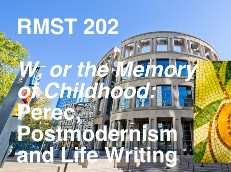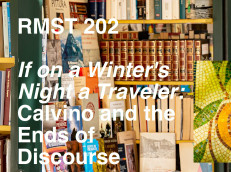I first heard of Georges Perec as a young teen scrolling through Tumblr when I stumbled across a post about another novel of his, A Void, where he avoids the letter ‘e’ throughout the novel. I was pleasantly surprised when I realised that we’d been assigned his work. Similarly to others whose blog posts I have read, I initially struggled with the two storylines but got used to it fairly quickly. Apparently these two storylines are supposed to depend on each other, rendering each one incomplete without the other. Truthfully, I haven’t been able to discern why they are so dependent on each other, though I hope to understand the text a little further after some class discussion.
I think an important feature of the text is that it has an unreliable narrator, who is telling this story based on unreliable memories and this fictional world of W that he created in his head. I always think an unreliable narrator can be a refreshing twist on the experience of reading a book because it makes you question what you’re being told rather than just taking everything at face value.
I found the parts where the narrator was explaining all the different sports teams and rules a little difficult to follow (not surprising because I’m a little like that when it comes to real teams, forget fictional ones) and became a little lost in the significance of explaining it all in such detail. A potential answer that comes to mind is that it’s all just a coping mechanism; there might not be an inherent significance in the sports teams and all the rules and regulations, but simply the fact that it’s so detailed shows the amount of time the narrator must have spent inside his own head as an escape from the world around him. Considering that Perec’s parents were killed in the Second World War and the Holocaust, it is unsurprising that some of his work should be informed by trauma.
Throughout the novel there is an interesting discussion of names, where they come from, and the importance we attach to them. My favourite part was when he was discussing the nicknames that were first given to individuals, before eventually being passed down and becoming a status symbol and evolving even further. It makes me want to imagine our own society using names in that same way; I’m not convinced it’d be entirely practical but it would be a fun thought exercise. The question I now pose is: what do you think the significant of all the sport-talk is?


